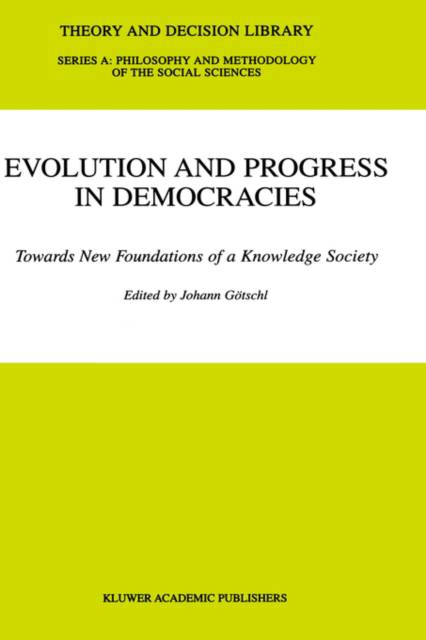
- Retrait gratuit dans votre magasin Club
- 7.000.000 titres dans notre catalogue
- Payer en toute sécurité
- Toujours un magasin près de chez vous
- Retrait gratuit dans votre magasin Club
- 7.000.0000 titres dans notre catalogue
- Payer en toute sécurité
- Toujours un magasin près de chez vous
Evolution and Progress in Democracies
Towards New Foundations of a Knowledge Society
209,95 €
+ 419 points
Description
In a ground-breaking series of articles, one of them written by a Nobel Laureate, this volume demonstrates the evolutionary dynamic and the transformation of today's democratic societies into scientific-democratic societies. It highlights the progress of modeling individual and societal evaluation by neo-Bayesian utility theory. It shows how social learning and collective opinion formation work, and how democracies cope with randomness caused by randomizers. Nonlinear `evolution equations' and serial stochastic matrices of evolutionary game theory allow us to optimally compute possible serial evolutionary solutions of societal conflicts. But in democracies progress can be defined as any positive, gradual, innovative and creative change of culturally used, transmitted and stored mentifacts (models, theories), sociofacts (customs, opinions), artifacts and technifacts, within and across generations. The most important changes are caused, besides randomness, by conflict solutions and their realizations by citizens who follow democratic laws. These laws correspond to the extended Pareto principle, a supreme, socioethical democratic rule. According to this principle, progress is any increase in the individual and collective welfare which is achieved during any evolutionary progress.
Central to evolutionary modeling is the criterion of the empirical realization of computed solutions. Applied to serial conflict solutions (decisions), evolutionary trajectories are formed; they become the most influential causal attractors of the channeling of societal evolution. Democratic constitutions, legal systems etc., store all advantageous, present and past, adaptive, competitive, cooperative and collective solutions and their rules; they have been accepted by majority votes. Societal laws are codes of statutes (default or statistical rules), and they serve to optimally solve societal conflicts, in analogy to game theoretical models or to statistical decision theory. Such solutions become necessary when we face harmful or advantageous random events always lurking at the edge of societal and external chaos.
The evolutionary theory of societal evolution in democracies presents a new type of stochastic theory; it is based on default rules and stresses realization. The rules represent the change of our democracies into information, science and technology-based societies; they will revolutionize social sciences, especially economics. Their methods have already found their way into neural brain physiology and research into intelligence. In this book, neural activity and the creativity of human thinking are no longer regarded as linear-deductive. Only evolutive nonlinear thinking can include multiple causal choices by many individuals and the risks of internal and external randomness; this serves the increasing welfare of all individuals and society as a whole.
Evolution and Progress in Democracies is relevant for social scientists, economists, evolution theorists, statisticians, philosophers, philosophers of science, and interdisciplinary researchers.
Central to evolutionary modeling is the criterion of the empirical realization of computed solutions. Applied to serial conflict solutions (decisions), evolutionary trajectories are formed; they become the most influential causal attractors of the channeling of societal evolution. Democratic constitutions, legal systems etc., store all advantageous, present and past, adaptive, competitive, cooperative and collective solutions and their rules; they have been accepted by majority votes. Societal laws are codes of statutes (default or statistical rules), and they serve to optimally solve societal conflicts, in analogy to game theoretical models or to statistical decision theory. Such solutions become necessary when we face harmful or advantageous random events always lurking at the edge of societal and external chaos.
The evolutionary theory of societal evolution in democracies presents a new type of stochastic theory; it is based on default rules and stresses realization. The rules represent the change of our democracies into information, science and technology-based societies; they will revolutionize social sciences, especially economics. Their methods have already found their way into neural brain physiology and research into intelligence. In this book, neural activity and the creativity of human thinking are no longer regarded as linear-deductive. Only evolutive nonlinear thinking can include multiple causal choices by many individuals and the risks of internal and external randomness; this serves the increasing welfare of all individuals and society as a whole.
Evolution and Progress in Democracies is relevant for social scientists, economists, evolution theorists, statisticians, philosophers, philosophers of science, and interdisciplinary researchers.
Spécifications
Parties prenantes
- Editeur:
Contenu
- Nombre de pages :
- 394
- Langue:
- Anglais
- Collection :
- Tome:
- n° 31
Caractéristiques
- EAN:
- 9781402000638
- Date de parution :
- 31-10-01
- Format:
- Livre relié
- Format numérique:
- Genaaid
- Dimensions :
- 156 mm x 234 mm
- Poids :
- 739 g

Les avis
Nous publions uniquement les avis qui respectent les conditions requises. Consultez nos conditions pour les avis.





